#it would be a creative batshit masterpiece
Text
shane could and should write a book of fiction.
#it would be a creative batshit masterpiece#even if its for children#sara could illustrate just sayin#i’d read it#i’d read the shit out of it#shane madej#watcher#watcher entertainment#puppet history#hot daga#cc tinsley
129 notes
·
View notes
Text
so there's a lot, A LOT, I could say about James Somerton's apology, such as his avoiding discussing things like misinformation and his misogyny, his insane justification for his plagiarism (as a person who makes history content I often copy-paste things over into a word doc because I get tired of switching between tabs, and I have NEVER mistaken something for mine because the FONT is often different but also, even if the font is the same, I know my own writing style well enough to know when something isn't mine), the mentioning of his poor family background ("my dad is illiterate because he had to drop out when he was 7...you know, which is usually around the time that kids have already been taught how to read, RIGHT! I'M GOING WITH THAT!"), etc, etc, etc.
The thing I do want to talk about is his "filmmaking dreams". Mostly because as another Canadian filmmaker, his excuses are bullshit. If James Somerton actually wanted to be a filmmaker, to just make movies, he already would've made at least several shorts. And yes, it is completely possible. It would be difficult, and they probably wouldn't have been masterpieces, but it is absolutely possible. If his support system was as good as he says it was in Nova Scotia, if he had as many other creative minds around him, he would've been out shooting stuff. Hell, I've spent the last few months mapping out a new script, that I'm literally starting to shoot NEXT WEEK. If he wanted to make something, HE WOULD.
And even so, his justifications for continuing to change projects are also batshit. Let's say that I write a script in November, and I want to shoot in June, which is apparently the situation that he found himself in. That is about 7 - 8 months. That is plenty, PLENTY, of time to finish a script, find a crew, nail down some locations, secure some more funding, and cast. Plenty. This idea that he had to change because his film required a summer element and he had to change because of the weather is crazy to me.
Not only that, but there are plenty of film support groups in Canada, focused on producing Canadian content. For example, there's Telefilm, which will give you money, even match your crowdfunding up to a certain number, as well as plenty of other groups. If he had actually wanted to make movies, he would've been asking them for money. You know, groups who will LEGALLY hold you accountable if a film isn't made.
All of this to say is that James Somerton doesn't want to make movies. I doubt he gets any actual joy out of the process of creation at all. He wants to be admired. He wants the glitz and glam of being a filmmaker without doing any of the hard work. He's a lazy creator at the end of the day, and he will find any justification, ANY, to not do the work, whether it's stealing from other creators to "raise their voice" or switching projects again and again and again in an attempt to justify keeping the money that his fans gave him.
87 notes
·
View notes
Text
No Country for Honest Assessment
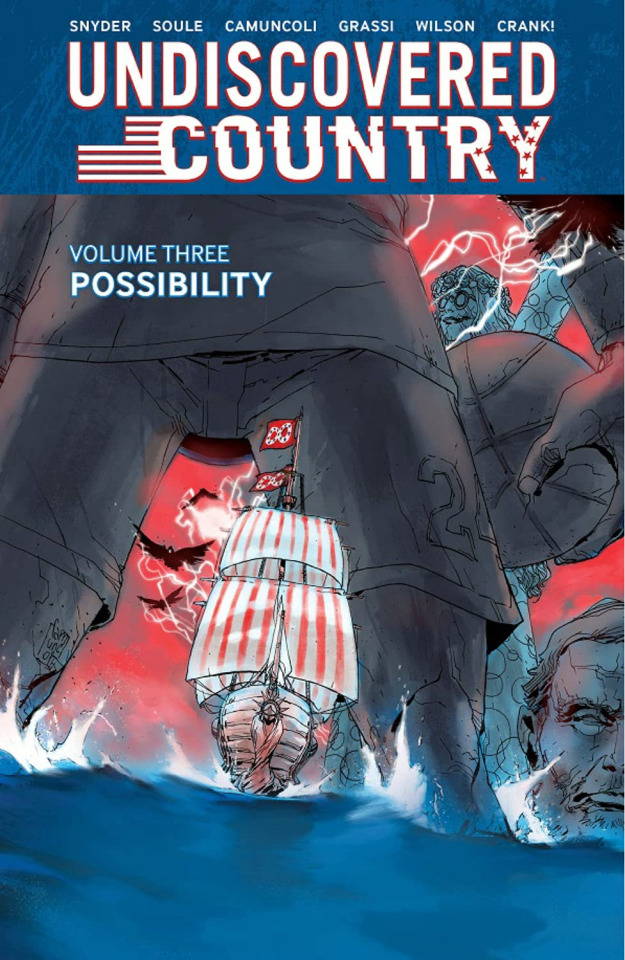
I've been continuing with this comic despite the batshit craziness of some (ok, a lot) of its worldbuilding. (Reviews of Volume 1 and Volume 2.) I guess that means the overall story is compelling enough to continue? That is probably true, but this is the first volume where I feel the writers deliberately pulled back from examining their story's premise in a way that would have added a lot more meaning and heft.
Nearly forty years in the future, when a group of people are trying to find their way out of a future America that has cut itself off from the rest of the world (never mind the global community/economy/information exchange is such that this couldn't happen; this is only one of the handwaves you have to look past to go with this), said group has reached the third of thirteen balkanized American zones: Possibility. As described in the comic:
Once populated by all the creatives responsible for the stories and myths and music and styles and culture that made America what it was to the world. The dream.
Out of all the zones, Possibility was tasked with making new creations that would redefine this land so that when the doors re-opened, the American dream would be renewed.
To pass through this zone, our group has to create a brand-new American masterpiece: a story, painting, sculpture, artwork--something that grapples with the myth/dream of America. Although one character immediately throws out a poem that works perfectly well for me:
Roses are red, violets are blue,
America's awful, and fuck you too.
I mean, this sums up the country in a lot of ways, past and present. But, y'know, if they had used that we wouldn't have a story.
The person who ends up being tasked to do this is one of the characters of color: Ace Zenyatta. He considers how to tell the American story and comes up with this:
Yes, I've been thinking about the quintessential American story. Immigration, assimilation, race, class...all part of it. But one story has captivated Americans since the beginning. Three words.
Rags to riches.
So many American stories follow that model. Someone comes from nothing and ends up on top of the world.
And I thought, really? The two white writers are having the black guy say this? Without mentioning America's history of slavery, genocide and Jim Crow, and how that plays into restricting who can actually achieve this rags-to-riches fantasy?
This would have been a very rich vein to tap if the writers had had the balls to really grapple with it. (Also, bringing in a writer of color might have helped.) As it is, they come close in a couple of places, but they end up pulling their punches and ducking away. This pretty much spoiled the impact of this volume for me.
Look, I'm sure many people read this comic just for its overall batshittery. It is pretty over-the-top compared to others. But it's disappointing that they come up with a storyline that is supposed to explore the mythology and dream of America--and they don't actually do it.
0 notes
Text
MAD LOVE (’35): She Loves Me...She Loves Me Not! by Theresa Brown
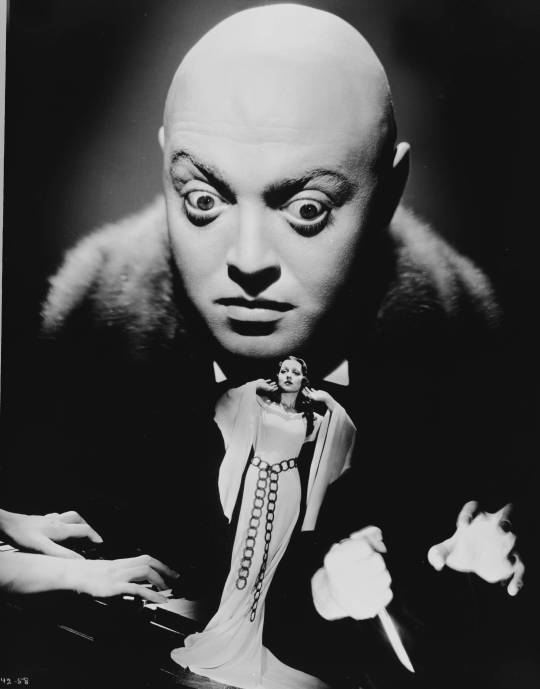
To say we’re all sorely disappointed that the 2020 TCM Classic Film Festival was canceled this year, is a gross understatement. For many of us, this annual gathering of classic film fans in the heart of Hollywood is the highlight of our year. Hotels...flights...passes, getting together again with new old friends and old new friends is a blast! But a pandemic is nothing to play around with. Better safe than sorry.
Have no fear, though. TCM IS on the case. They have decided to have the TCM Classic Film Festival: Special Home Edition this weekend (April 16-19), where films and interviews from past Festivals are being aired. TCM is screening one of my favorite films from the 1930’s this Sunday, April 18th and it stars the only actor in classic films who fills me with pathos and revulsion simultaneously.
MAD LOVE (‘35) is a remake of THE HANDS OF ORLAC, a 1924 Conrad Veidt film where a murderer’s hands are grafted onto a musician. The movie was made again in 1960 with Mel Ferrer and Christopher Lee playing the symbiotic duo. I’ll wager the doctor in neither the 1924 movie nor the 1960 film could match the disturbing intensity of Peter Lorre:
Gogol: “I, a poor peasant, have conquered Science. Why can’t I conquer Love? Don’t you understand? You must be mine, not his. You ARE mine!”
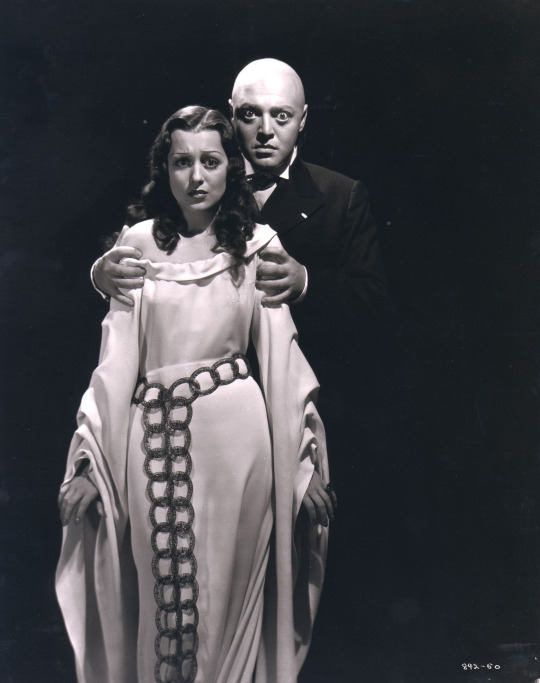
Lorre stars as Dr. Gogol in MGM’s turn at horror. This has got to be the more disturbing and macabre entries of this entire TCMFF Special Home Edition weekend. In the movie, Lorre plays a well-respected surgeon with a steady hand who repairs the maimed, deformed and broken. But nightly, he attends a play in the Grand Guignol-style, where the torture porn of a beautiful actress onstage almost sends him into a swoon. Frances Drake plays the actress Yvonne Orlac. I confess, I’ve only seen three of Drake’s films. She left the business early, having a mere 24 credits to her name (See BOLERO [‘34]), but she’s very good here expressing love, revulsion and downright fear as the object of Lorre’s obsession.
In the movie, Lorre is invited to the cast party, where he learns that Drake’s quitting the play to join her new pianist husband on his concert tour. At the party, with a slice of wedding cake, one gets to kiss the bride. When Lorre steps up to the plate, he plants a good one on her to the glee of the cast; we see her swallow her revulsion. However, she’ll soon need the good doctor’s help in performing an operation to prevent her husband’s mangled hands from being amputated due to a train wreck.
Gogol: “Is there no room in your heart, even pity, for a man who had never known the love of a woman, but who has worshiped you since the day he walked by...I can’t be silent any longer. You are a woman, you must’ve known!”
Yvonne: “Yes, I know of your feeling for me. I traded on it.”
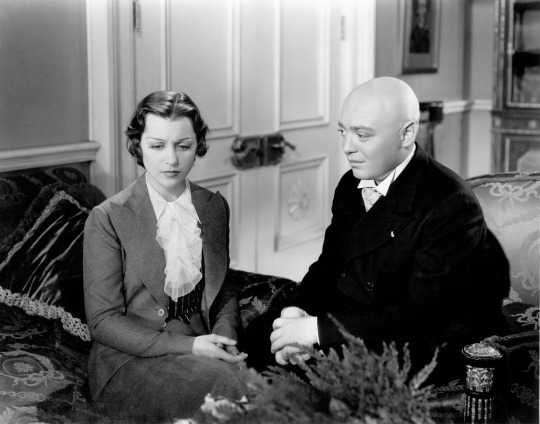
There’s enough blame on both sides, to be fair. Yvonne knew she was stringing him along to get his help and expertise; and Dr. Gogol knew she would not love him...she’s married. He’s a pitiable strange bird and she’s unavailable to him. He doesn’t take no for an answer. Aye, there’s the rub. There comes a point when unrequited love is truly just emotional masochism. And when Lorre turns that corner and puts a plan in place to really make her his, the movie goes into high gear. He fancies himself Pygmalion, though a twisted one. Lorre, the actor, is fearless. He’s not afraid to look odd. He’s not afraid to give in to the emotion of the insane - wearing it...sitting with it...washing in it. He wallows in it. You’ll know what I mean when you see him. It’s the most unsettling thing I’ve seen in all the 1930s.
You might know Karl Freund from his directing years of I Love Lucy, but he had a hefty, creative career in the movies. He directed the seminal DRACULA (‘31), THE MUMMY (‘32) and lit the screen for Fritz Lang’s masterpiece METROPOLIS (‘27). Now, he doesn’t bring all his German cinematography of shadows, Dutch angles and Expressionism to bear in this film. After all, it is still glossy, shiny MGM. It’s pretty straight-forward directing. Freund does give me a moment I love, however. Drake is in a locked room and through the small window in the door she sees Lorre coming up the stairs totally batshit crazed. The camera dollies in towards Drake as she sees this frightening sight and it draws you in.
Rounding out the recognizable cast of character actors are: the distraught and horrified husband (Colin Clive); some minor comic relief from Ted Healy and Sara Haden as a reporter and maid respectively; Edward Brophy as the guillotined, knife-throwing murderer whose hands are grafted onto Clive; Keye Luke as the doctor’s assistant; and look...it’s child actor Cora Sue Collins, who appeared at the TCM Classic Film Festival in 2019 for the screening of this film.
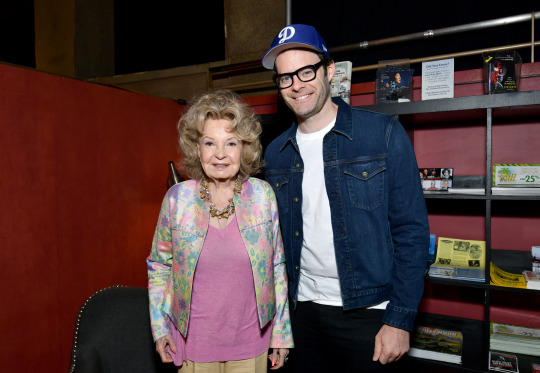
For this not being an all-out monster movie a la DRACULA or FRANKENSTEIN (’31), it is intense and unsettling. It also begs the question, is all fair in love and war? I don’t know. But you know how the old song goes:
If you can’t be with the one you love...don’t do what Dr. Gogol does.
#Mad Love#Peter Lorre#Francis Drake#horror#MGM#1930s#TCM#TCMFF#Turner Classic Movies#Theresa Brown#Bill Hader#Cora Sue Collins
75 notes
·
View notes
Text
Ok so I um went on a tear of randomly reviewing older cartoon network cartoons? Don't ask me why but here we are with my WILDLY inconsistent blog: (Also if I'm incorrect on something or got something wrong this is all from memory so yeah, apologies)
1:Ed, Edd and Eddiewas such a wonderful unbashfully weird show that's a lot more interesting and dark than alot of people give it credit for, a vast cast of unforgettable fleshed out characters with their own personalities and quirks. A show that brillaintly captures that strangeness and wonder of childhood as well as the strange mix of individuals that most people know as children
2:The Power Puff Girls with an interesting and varied (if not disturbing at times) character design had a extremely wide array of very interesting and iconic villains most of which are much more interesting than the Power Puff Girls themselves. A fun take on the superhero cartoon genre with many fun ideas that are explored as well as having a very fun kid friendly atmosphere as well as artfully walking the line allowing for some adult humour subtly slipped in. The rebot suffers from a lack of that, especially with the absence of the beloved Miss Sarabellum who's presence will be missed as she flustered and helped the Mayor Of Townsville keep the ship a float. A good show not without its faults
3:The Camp Lazlo also has some interesting character design, catchy theme but unfortunately mostly forgettable characters with none immediately springing to mind other than the titular Lazlo himself. A good show but mostly forgettable
4:Ben 10 the orginal series is a wonderful take on the superhero genre with characters as interesting and well rounded and the many designs if the show. Wonderfully memorable characters such as Kevin 11 and Dr Animo, unfortunately the main villain of the original series isn't all that interesting being a little clichè but is made up for time and again through the introduction of The Plumbers as well as their dark, antagonistic counter parts The Forever Knights. Genuinely interesting side plots with beautifully memorable moments straight from the get go all while capturing all the snark and almost sibling like rivalry between Ben and his cousin as well as the his relationship with his grandfather Max being not dissimilar to the relationship Uncle Ben and Peter Parker, and perhaps could be a good idea of what that relationship would be like if Uncle Ben had not passed. The later seasons were, I believe, just as good if not better regarding villains and character development with such beloved characters such as Professor Paradox and Attea. It's a great shame that the reboots were not able to capture these same elements with a frankly ugly animation style and significant lack of meaningful relationships that the original had and the character never seems to grow like in the original series
5:The fosters home for imaginary friends theme is perfect and really aesthetically pleasing, a beautiful concept that perfectly illustrates the importance of a healthy imagination as well as having many very creative character signs as well as a disabled chacter and never having that disability be the butt of any jokes. As well as this the addition of Goo, a young poc girl, was made clear to ADHD, whether it was specifically said or not was heavily implied and once again is handled beautifully as this character is accepted into the home as a reaccuring friend for Mac, although a few hiccups occur, she is a wonderful addition to the cast. Fun and interesting story lines and a wide array of charcters with their own district personalities makes for a true delight and a wholesome kid friendly television show
6:Code Name Kids Next Doors theme is brilliant and it's a show that perfectly illustrates what adults are like to children, mostly either absent and dismissive or active antagonists in the children's lives
7:The Grim Adventures Of Billy and Mandy was way darker that it had any right to be, starting off with seeing the main charcters as skeletons, then have meat and muscle splayed onto them then the skin rapidly growing on to that within the opening sequence, a brilliant show that has the perfect amout of deadpan and slapstick humour
8:Johnny Bravo has a brilliant catchy song and a wonderful, empowering message teaching young boys that no woman will ever like you if you treat them like objects as well ad teaching young woman that it's good to stand up for yourselves against men like Johnny, who is kind of a brilliant rep of someone who peaked in highschool, lives with their mother and never really grew up
9:The Scooby Doo theme while a classic and is very fun, goes on for much longer than it should, the second rendition of Scooby Doo:Mystery Inc. Really does the show justice while the original is dare I say a little lack luster
10:My Gym Partner is A Monkey, while an interesting show and premise, is a little disappointing. Frankly annoying voice actors and a loud, irritating theme that once more goes on for much longer than it should. A good show but has quite a few faults nonetheless.
11. Samurai Jack is an absolute masterpiece of western anime, a genuinely beautiful animation style, witty and far and few between dialog, beuatiful and very well animated fight sequences as well as an interesting and engaging story line with many memorable charcters as well as the titular Samurai himself who is easily one if my favourite cartoon characters of all time as well as Aku, a wonderfully interesting villain who creates distopian, almost capitalistic hell scape future in which he flings the noble Jack into from the past. My favourite theme song of all time
12:Cow and Chicken. A show that so bizarre and strange that you can't help adore it with a batshit premise and a very crunchy animation style that is as odd as the characters themselves. Honestly quite inappropriate and gets away with a lot more than it would now, a brillaint show that's easily over looked
2 notes
·
View notes
Text
Best Films of 2017, Part I
10. Get Out (dir. Jordan Peele)

“... Now sink into the floor.”
Making the jump from sketch comedy to the big screen is a transition fraught with creative peril. The list of those who have tried and failed to navigate its intricacies is a list filled with a lot of talented people, and we can rest assured that not a one of them decided to cut their directorial teeth on a project as impossibly ambitious as a pseudo-satirical horror film that takes on racism in American society. But where so many others have failed, Jordan Peele has succeeded brilliantly, kicking off his directorial career with the latest in a growing string of Sundance-premiered, subtext-heavy horror masterpieces.
Blatantly confrontational in all the best ways, that Get Out emerged from the major studio ecosystem is a minor miracle in some senses, but really is a testament to the strength of Peele’s razor-sharp (and now, Oscar-winning) original script. Taking aim at the casual, insidious racism of liberal white America, Peele meticulously picks apart the ways that African American work and creativity is systemically marginalized, colonized, and exploited. The film’s pointed symbolism and fearless direction make it a frequently discomfiting watch, but Get Out is all the more essential for it. Jordan Peele is not here to comfort his white audience, he’s here to wake us the fuck up.
Despite it’s satirical underpinnings, Get Out is a horror film, through-and-through, and its brilliance lies in large part with its keen ability to indulge its more outlandish horror inclinations right up to the tipping point from horror to satire. Peele flirts with that line brilliantly, getting every last bit of mileage out of each genre conceit that he either exploits or subverts, before snapping us back into perspective with one simple reminder: if you think this is a joke, you’re missing the point ...
*Cough* Golden Globes ... *Cough* *Cough*
9. War for the Planet of the Apes (dir. Matt Reeves)
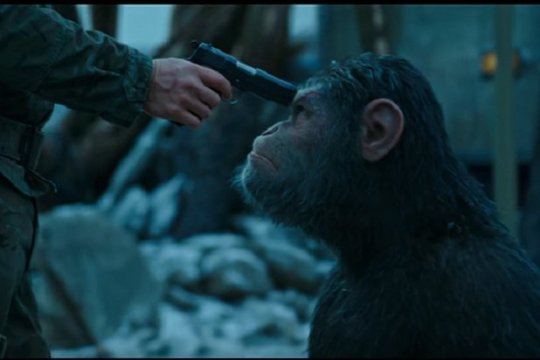
“Apes together strong.”
Looking back on the original Charlton Heston epic, it’s not exactly plain to see where Matt Reeves drew inspiration for his utterly brilliant Planet of the Apes reboot trilogy. Despite its esteemed status in the sci-fi pantheon, the original views now as little more than a campy 70s genre flick with an interesting premise and a great final twist. But from those bones (and conveniently ignoring an ill-advised early 2000’s remake) Reeves has crafted a franchise masterpiece. An unprecedented hybrid of muscular action filmmaking and art-house drama, and deftly borrowing elements of silent film, it’s difficult to overstate just how impressive the entire Planet of the Apes trilogy is. However, it’s final installment, War for the Planet of the Apes, stands as it’s greatest entry – a sweeping epic built with an uncanny feel for grandiose spectacle and an unmatched command of the jaw-dropping technical wizardry that makes its central performance possible.
Andy Serkis’ groundbreaking motion capture performance as Caesar, leader of the titular apes, is the film’s true foundation. You could make a convincing argument that Andy Serkis’ Caesar is the greatest hero of 21st century genre filmmaking, but it’s status as a monumental achievement in the marriage of acting craft and filmmaking technology is frankly unquestionable. That Serkis’ performance has been all but forgotten by major awards bodies throughout this remarkable three-film run will not be remembered kindly in the annals of film history – this performance is the stuff film history is made of. Reeves stages one brilliant, sprawling action set-piece after another, and the uncanny physicality of Serkis’ performance injects them with the dose of emotional resonance that elevates it well above traditional summer blockbuster fare. Honestly, filmmaking of this scale has rarely been better.
8. The Shape of Water (dir. Guillermo del Toro)

“When he looks at me, he does not know what I lack, or how I am incomplete … He sees me for what I am, as I am.”
The Shape of Water is everything you could want from a Guillermo del Toro film – fantastical, brutal, and ultimately hopeful; a beautiful modernist fairy tale with a definite moral compass. Del Toro himself has described The Shape of Water as his favorite film that he has ever made, and it’s easy to see why he’s so infatuated. A meditation on the lives of outsiders and the ways that love pushes across boundaries of convention, del Toro’s sincere affection for the characters onscreen is clear throughout, with each new wave of its strangely rapturous romance lending new evidence to the greatness that del Toro has so lovingly crafted.
A testament to his sterling reputation, del Toro assembled one of the year’s best casts to bring his sweeping vision to life. Octavia Spencer, Richard Jenkins, and Michael Shannon are all impressive in their supporting turns, but make no mistake, this film belongs to Sally Hawkins. She turns in career-best work as a mute janitor at a secure government facility who forms a deep connection with an amphibious creature imprisoned there. Hawkins conveys more in a glance than an average performance can do with an entire script’s worth of dialogue. If there’s a better performance that’s been committed to film this year, I’ve yet to see it …
Guillermo del Toro is one of cinema’s most unique voices, and The Shape of Water is the kind of film only he could make. It moves in the span of a breath from bracing violence to endearing whimsy to magical sensuality. In the hands of another, it could easily have been ludicrous, but with del Toro’s otherworldly creativity, it’s simply lovely.
7. I, Tonya (dir. Craig Gillespie)
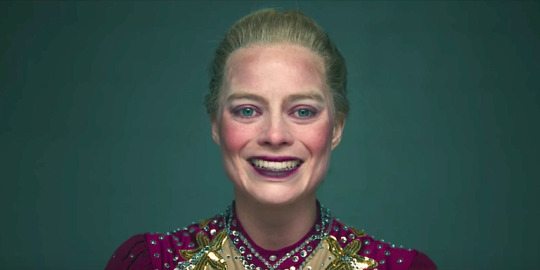
“There's no such thing as truth. It's bullshit. Everyone has their own truth, and life just does whatever the fuck it wants.”
Tonya Harding is one of the most infamous figures in American sports history, having been implicated in a plot to attack her biggest rival to improve her chances of making the Olympic figure skating team. Hers is a story stranger than fiction, and the electric biopic I, Tonya brings it to the big screen in all of it’s bizarre glory. Far from a household name, despite having an award-winning indie (the stellar Lars and the Real Girl) and two warmly received major-studio pics under his belt, I, Tonya is director Craig Gillespie’s most dynamic film to date. Leaning into the scripts more out-of-the-box tendencies, Gillespie has made the most batshit biopic since Todd Haynes’ kaleidoscopic Bob Dylan exploration, I’m Not There. He breaks all the rules, and a lot of it has no business working. But work it does - a directorial feat for which Gillespie has not been properly recognized.
But without Margot Robbie’s electrifying lead performance, it all may have been for naught. Robbie is quickly claiming her place as one of her generation’s finest actresses, and her embodiment of Harding as a tragicomic figure undone by her own inability to accept responsibility is nothing short of fantastic. Robbie’s Harding is an internal battle between the fierce competitor and battered victim, and highlights the ways in which those dual realities eventually were inextricably interwoven. It’s impressive work that walks the tough line of bringing a publicly reviled figure a bit of deserved sympathy - but not too much.
The film sets out to contextualize Harding’s public life, grounding everything that leads up to “the incident” in the abusive nature of her home life, but never going so far as to excuse Harding entirely. The film’s brilliant fourth-wall-breaking narration - pulled form real-life interviews with Harding, her ex-husband (Sebastian Stan), and her mother (a brilliantly caustic Allison Janney) - serves to highlight how frequently their accounts of the Kerrigan attack clash not only with each other’s, but with the plain reality of the situation. It’s a conceit that consistently sticks the landing, one darkly comedic beat after another, and makes for one of the most purely engrossing films of the year.
6. The Florida Project (dir. Sean Baker)
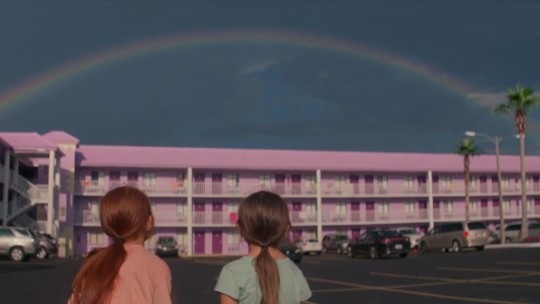
“You know why this is my favorite tree?
Why?
Because it’s tipped over and it’s still growing.”
Sean Baker made serious waves at Sundance with his debut feature Tangerine. Not only did the film feature mostly non-professional actors, but Baker shot the whole thing on his iPhone – no small feat for a film deemed worthy of the biggest indie film festival in the world. Baker shrewdly leveraged that success into a budget that afforded him the use of an actual crew. While adapting his on-the-fly style to the inherent inertia of a larger on-set footprint wasn’t always smooth, the results of his efforts are undeniably superb. His sophomore effort, The Florida Project, is fresh independent filmmaking of the highest order.
Once again employing mostly first-time professional actors – with the notable exception of Willem Dafoe, who effortlessly turns in one of the finest supporting performances of the year – Baker endeavors to tell a story that’s built from bits and fragments of real-life that he’s simply lucky enough to observe. What he sees pits the desperation of poverty against the buoyant idealism of childhood. The innate optimism of its child characters stands constantly at odds with the increasingly grim realities with which the adults in their orbit try (and often fail) to grapple. Few films can so deftly play as gritty realism and buoyant fantasy at once, but The Florida Project walks the line with tragic grace.
Now two-for-two, Baker is positioning himself alongside the likes of Andrea Arnold as a master of the realist style, with a keen eye for drawing pathos out of the real lives of those living in societies margins. Much of what you see on the screen may seem like little more than a snapshot, but it takes a special artist to paint such a vibrant portrait of a segment of American society that many would prefer to ignore. Very few filmmakers in the world could make a film anything like this one, and it’s entirely possible none of them could have made one this beautifully compassionate.
#best films#Best Films of the Year#best films of 2017#oscars#academy awards#i tonya#the florida project#get out#war for the planet of the apes#the shape of water
5 notes
·
View notes
Text
Film Journal: 8.14.17 - 9.24.17
LOGAN LUCKY (Steven Soderbergh, 2017): 7.7
I’m very glad he’s back with “yet another” intelligent, funny, breezy but shaggy flick that nothing less than good time but also unafraid to dig into the emotional well too. Add this to the trend of recent films prominently using John Denver songs. I’m a fan of this trend.
MARJORIE PRIME (Michael Almereyda, 2017): 6.7
Its reach far exceeds its grasp (but bless it for trying) and it suffers a lot from being very much a filmed play. Yet it has a lot to say about aging, memory, mortality, love, and family and what could possibly say it all. It helps that everyone involved is working the heck out of their roles, Geena Davis particularly being quite the surprise for me.
SUMMER HOURS (Olivier Assayas, 2008): 7.3
Assayas remains a filmmaker that has all the makings of a master but has yet to make his masterpiece (haven’t seen IRMA VEP yet though, so maybe I just haven’t seen it). Well appointed, well filmed, well acted, yet somehow still detached, this is a film so French in its French-ness that it should be served with a wheel of brie.
CREEP (Patrick Brice, 2015): 5.5
This would be quite something if it found the nuance it was looking for. But it didn’t, so it was just there as a thing that exists and is mostly not bad. Hopefully it finds its purpose in the sequel.
THE ESCORT (Will Slocombe, 2015): 5.6
Plenty of premise here and hints at actually dealing with its subject matter in a deeper and more clever way, but drops all that for a cutesy romcom thingamjig that works as a student film with a professional sheen. Oh well.
IT (Andy Muschietti, 2017): 6.9
The kids are very good, and their genuine humor, warmth, and camaraderie go a long way in helping this adaptation work as much as it does. Stephen King’s best works combine genuine warmth and love for his characters and an almost sadistic willingness to subject them to absolute horror. This film drops the ball a bit on the horror, but it would require a prime talent to truly capture the kind of madness-inducing horror that the King’s material usual calls for (Cf. Stanley Kubrick). So instead we drop most of the eldritch horror and get some decent shape-shifting, evil clown scares which are fun but a bit disappointing. But we do get some hang out time with the kids, which was also just as needed. There’s a big opportunity for part 2 to use this as a springboard to really dive into the trauma and primal terror of these kids who are now adults. We’ll see.
MOTHER! (Darren Aronofsky, 2017): 9.1
The artistic/creative process as Judeo-Christian creation myth as domestic drama as batshit insane psychological thriller. Remember that stupendous sequence in NOAH where the fall of man is depicted? Did you wish, much like I did, that the whole movie was like that? Well, here it is, baby. The last 45 minutes are some of the boldest, most insane minutes I've seen in a studio film. It's brash and loud and even borderline ridiculous at times, but it works because it is so unabashed. Yeah, I get it, Aronofsky is screaming in our faces with a megaphone, but oh what a joyful noise.
KINGSMAN: THE SECRET SERVICE (Matthew Vaughn, 2014): 4.2
I liked the part where the heads exploded because that's what my head felt like doing while watching this mess.
THE DISCOVERY (Charlie McDowell, 2017): 4.5
It’s been a while since I’ve seen an premise as ingenious as this so heinously whiffed. There’s so much here to explore that the fact that they went for... nothing was kinda ballsy. Sad, but ballsy.
#LOGAN LUCKY#MARJORIE PRIME#SUMMER HOURS#film#film journal#IT#MOTHER!#KINGSMAN: THE SECRET SERVICE#THE DISCOVERY
0 notes